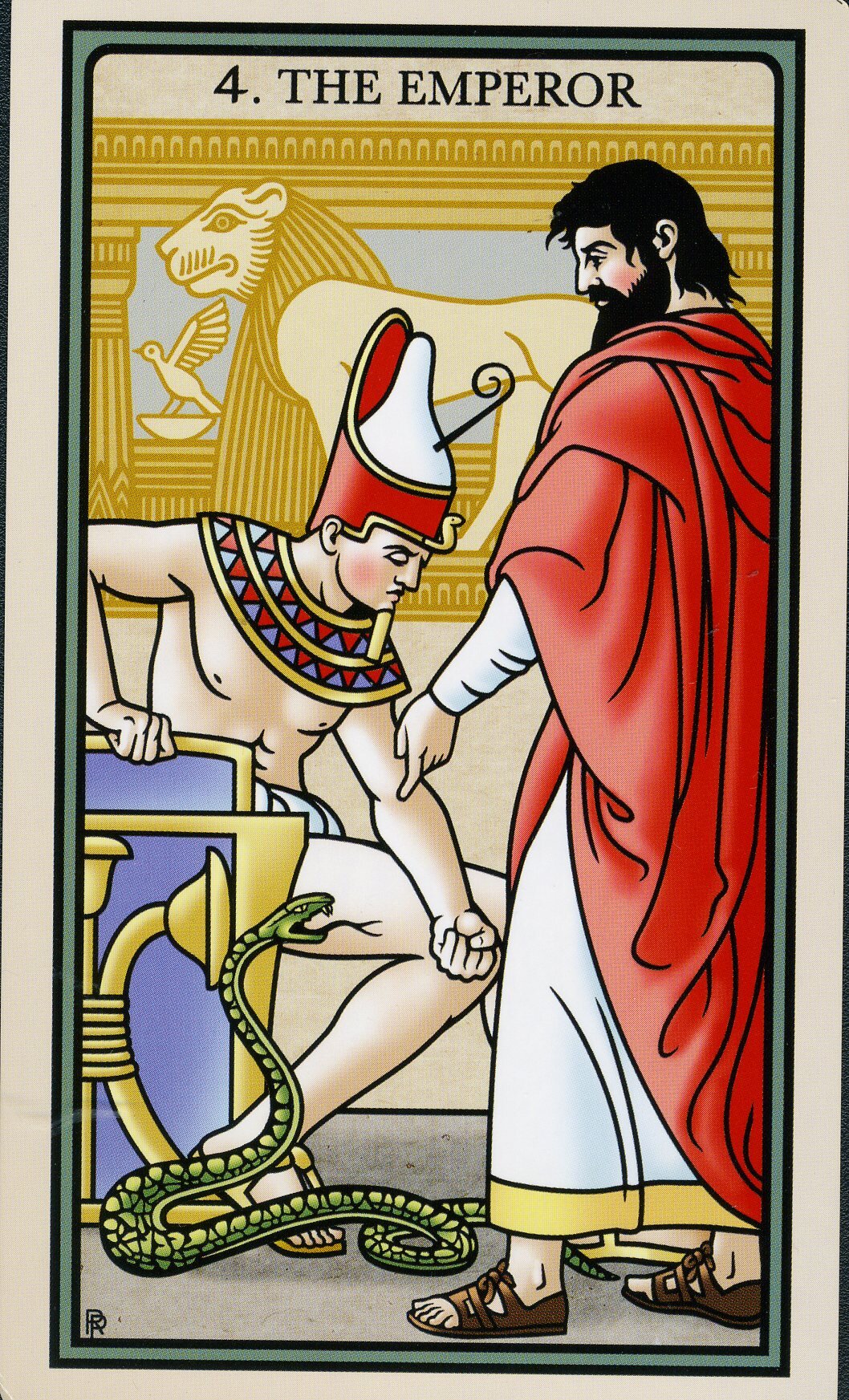Pharaoh and the plagues: Considering the Emperor card in the Raziel deck as Passover approaches during our modern plague.
/When Rachel Pollack and Robert Place created the Raziel deck based on Judaic myth and folklore, the choice was made to illustrate the Emperor as Pharaoh of Egypt, with Moses standing before him.
Moses told Pharaoh that he had to let the Israelites go or there would be plagues. But Pharaoh wasn’t about to free his unpaid workforce. He was warned again and again, but 5 times he hardened his heart and refused. And each time, the Egyptians suffered the consequences of his selfish desire to have unpaid workers build cities for his glory.
When I was in college, I remember studying the medieval mystery plays—in particular, the York and Wakefield cycle. They were called “cycles” for a number of reasons but among those reasons was the cyclical view of history they presented, often with the character who played Pharaoh (who ordered the slaughter of Israelite children) also playing Herod (who also ordered the slaughter of Hebrew children as the myth goes).
And indeed, I see this cycle playing out in front of our eyes right now. With a modern Moses who has been warning today’s Pharaoh for 3 months about our current plague. And this Pharaoh dismissing these warnings in favor of the stock market—his god. Of course, as he dismissed this plague, we all are suffering.
In Hebrew, Egypt is called Mitzrayim—the narrow or constricted place. And this is speaking mythically, this is both a physical and psychological narrowness.
As an enslaved people, the Israelites had lost their sense of themselves as a nation and could only see themselves as slaves. Their world had narrowed and they were unable to see beyond it, so when Moses first spoke to them of freedom they couldn’t hear him.
And of course, Pharaoh was of a narrow mind and was unable to see the evidence of the plagues before him. His people may have suffered but in his palace he wasn’t suffering. It wasn’t until he lost his son that he was affected.
The narrow mind of today’s Pharaoh needn’t be enumerated. A man who brags about the ratings of his press conferences as people are dying because of his malfeasance doesn’t even deserve to be named. However, just as the Divine could not be denied in the story in the Torah, as much as he may wish to spread “alternative facts” reality is catching up with him.
However, his actions have left us all in a different kind of narrow place. Those of us who care about our fellow citizens and the health of our society have voluntarily narrowed the space in which we are living right now. Some of us are in isolation/quarantine. Others of us are staying inside and limiting contact with others as much as possible.
For me, this leaves me with questions that can only be answered by the way I choose to respond to these circumstances. Especially as we approach the Passover holiday, which celebrates freedom from enslavement. Certainly, this year, my practice of Counting the Omer using tarot will find much to work with in the challenges I face living alone in this pandemic. And I will find many blessings to be grateful for, since I have a place to live, food to eat, and I am apparently healthy (since I know that symptoms can take two weeks to manifest).
But I find myself asking, how am I thinking narrowly about my situation? Is it possible to find freedom in a situation of constriction—and what would that look like? How can I connect with others safely so that any feelings of isolation are broken? How can I free myself from fear of getting sick (this is less an issue since I lived through the early years of the HIV crisis and learned how to work with my fear of contagion, but still)? How can I offer support to others while staying safe? What warnings does my inner Pharaoh refuse to pay attention to? What narrowness do I carry with me even after years of working to free myself?
Some of these questions may resonate for you. You will also have other questions for yourself that these musings bring up. If you’re willing to share them here, I would be grateful, since we are all each other’s teachers.
I’ll close with a quote from Viktor Frankl’s classic, Man’s Search for Meaning, that I often read to remind myself of the inner freedom that can never be taken away:
Everything can be taken from a man but one thing: the last of the human freedoms—to choose one’s attitude in any given set of circumstances, to choose one’s own way.
May you be healthy. May you be happy. And as the Passover approaches, may you find new ways to be free in the year ahead.
Card image from the Raziel Tarot, conceived by Rachel Pollack and Robert M. Place, image © 2016 Robert M. Place

